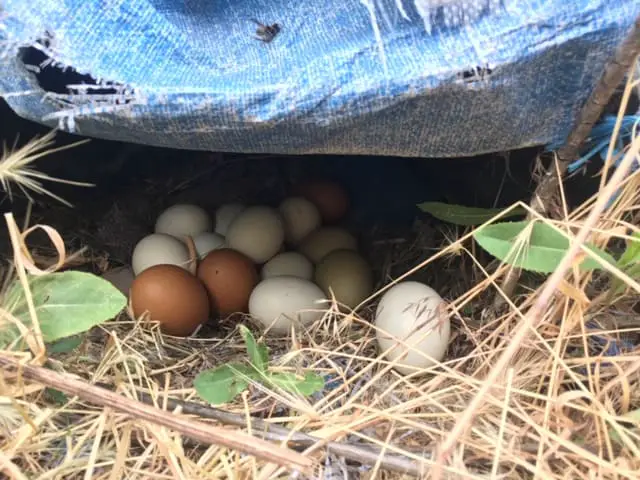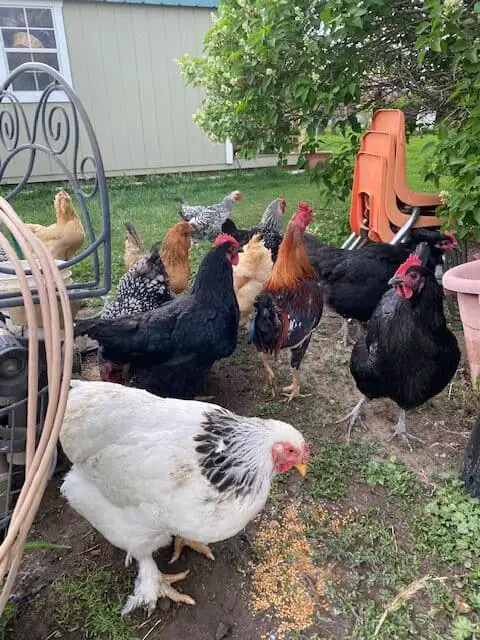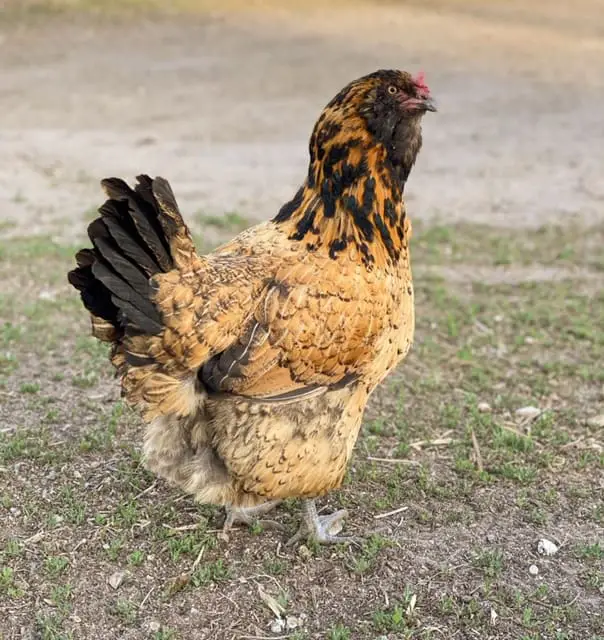7 possible answers to why chickens cackle so loudly after laying an egg.
There is no definitive scientific answer to this particular behavior; However, there are various hypotheses that have been proposed by poultry experts and breeders.
- The chicken is relieved that the egg is no longer inside her body and she’s exclaiming joy.
- The chicken is signaling that she is finished with the nest and other members of the flock can use the nest to lay their eggs.
- The chicken is bragging about her contribution to the flock with her magnificent egg.
- The chicken is signaling the rooster that she has laid an egg and is ready for him to assist in further fertilization.
- The chicken is seeking attention to draw predators away from the egg and nest.
- The chicken is upset with other chickens wanting to get into her nest.
- The chicken has been away from the flock for a while and is signaling to find where the flock has congregated.
The hen is just plain relieved.
One idea that has been projected about why chickens cackle after they lay an egg is that they are just plain relieved to have the egg out.
When you first begin to raise chickens, it is very exciting to see the eggs beginning to show up in the nest. The first eggs are small and have extremely thick shells. It takes a while for the eggs to reach “normal” production sizes, and it takes a while for the hen’s egg producing system to mature as well.
Reaching mature and regular egg production levels can be painful for some hens, and the stresses of daily egg production often become aggravating. As the normal 24 hour day wears on, a hen struggles to produce each egg, which in comparison to human egg production, can be quite cumbersome, and large proportionally. It is quite a process that a hen must go through daily to develop, prepare and pass an egg through her cloaca, or “vent”. As a matter of fact, a portion of uterine tissue actually extends through the vent with the egg, until the egg is completely released. Thus, it is no surprise that once the hen finally passes the egg, it is such a relief that she cackles for joy.
The chicken is signaling that she is finished with the nest and other members of the flock can use the nest to lay their eggs.
When raising chickens, you will notice that not all nesting spots are popular. Some nest boxes will be favored above others. And, though all of the nesting boxes may look the same, have the same bedding, same design, and structure, the hens will just pick a favored nest for some reason. It’s crazy to see a dozen eggs on one nest and none in the nest right next to it.
So, the competition for the favorite nest can be keen. When a chicken is finished laying an egg in a favored nest, she signals to the rest of the flock that the nifty nest is free to use. We often see hens try to sit on each other in the same nest as they attempt to use the preferred location for egg laying.

The chicken is bragging about her contribution to the flock with her magnificent egg.
Some of your hens will be timid and bashful. Most will be fairly confident in their status in the pecking order. They are proud of their accomplishments and who they are as a productive laying hen. Their eggs are a thing to behold and admire.
After they have laid their masterpiece, many hens feel a need to exclaim to the world that they have added yet another wonderful contribution to the flock. They burst with a song of intensity and volume to match their perfect creation.
The chicken is signaling the rooster that she has laid an egg and is ready for him to assist in further fertilization.
One practical idea that breeders have proposed for a hen’s loud exclamation following egg production is the need to communicate to the rooster that she will be creating a new egg. With this new egg comes the opportunity to make it a fertile egg. When the chicken is ready for the next egg to begin processing the cackling could be a signal to the rooster that the hen needs his services to create a fertile egg.
This idea seems fairly plausible. Inherent within the chicken is the idea to reproduce and increase the flock. It seems to make sense that the more fertile eggs laid the greater chance for the flock to grow.
The chicken is getting attention and drawing predators away from the egg and the nest.
This is another plausible, practical idea for the cackling after laying an egg. A major drive of the hen seems to be to increase the flock. When an egg is laid that is a vulnerable time for the egg. The egg will need time to incubate and hatch.
If a hen cackles and gets attention, the attention is on her, not the new egg. A killdeer bird does something similar. The killdeer birds will call while running away from the nest. The chicken similarly cackles as she leaves the nest drawing more attention to her than to the newly hatched egg. The chicken will get more attention from the predator than the egg will.
The chicken is upset with other chickens wanting to get into her nest.
As I stated earlier all nests are not created the same. There are more popular nests in the coop. As such when a hen gets the coveted nest she will want to stay there and use it to her liking as long as she would like. It is irritating when other hens keep pushing their way into the nest.
The idea is that when the chicken finally lays her egg her patience is done. She cackles out of sheer annoyance announcing that she is leaving the nest available for the next irritating hen to take over the coveted nest.

The chicken has been away from the flock for a while and is signaling to find where the flock has congregated to.
Some hens can lay an egg quickly. In and out of the nest fast. Kind of like changing tires on a pit crew at NASCAR. Many are not fast. Many hens will need to take their time and relax. Some will need to ease their minds about possible predators or competing hens. It will take a little time for the chicken to safely lay the egg.
As the flock free ranges, they will naturally move around. The location of the flock can change quickly. Especially if a treasure of worms or new green shoots are discovered to eat. Or a predator is seen, and the flock needs to scatter for cover. The flock being in a new place once a chicken is finished laying an egg is usually what happens.
The cackle of a hen after laying an egg could be a locating cackle. The chicken will cackle to locate where the flock has moved to. Generally, another chicken or the rooster will return the cackle and the hen can easily locate the new position of the flock.
Summary
There is no real scientific proof of any of these theories of why chickens cackle after they lay eggs. From observance of chickens over the years and talking with other poultry owners these theories might hold some truth.
The ones that seem most plausible are locating where the flock has gone, luring predators away from the newly laid egg in the nest, and signaling the rooster that she has laid an egg, and another egg will be in process shortly.
If you can, take some time to observe your hens and see when they cackle after laying an egg. You will see some pretty interesting behavior in your little chickens. I do think they sometimes are just bragging, or are annoyed.

